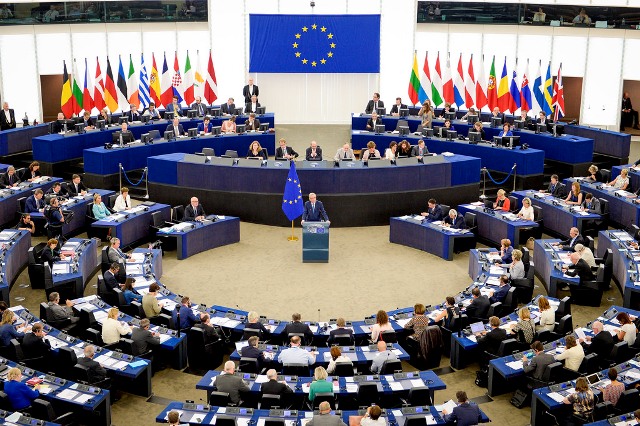 In 2001, Peter Hain delivered a speech exploring the UK's relationship with Europe, the Commonwealth and the world. [Photo:EU meeting/ source: European Union]
In 2001, Peter Hain delivered a speech exploring the UK's relationship with Europe, the Commonwealth and the world. [Photo:EU meeting/ source: European Union]
[This is an excerpt from an article which appeared in The Round Table Journal in 2002, taken from a speech delivered to the Royal Commonwealth Society by the Rt Hon Peter Hain who was, at the time, Minister of State at the Foreign and Commonwealth Office. The full text can be found in the Round Table archives.]
Young people are instinctively pro-European. They travel to Paris just as easily as to London. They get by with the language and drink the lager. But ask them about the Council or the Commission or the Parliament and they do not want to know. They are not necessarily hostile, more that they are not engaged. We need plain language, not Eurobabble. We need a new popular language if we are to reconnect the European Union to its citizens, to show that we are in fact talking about the things that really matter—jobs and prosperity, peace and security, social justice and the environment.
And above all, let us have the facts and demolish the myths. Myths like the European ‘superstate’, which the Eurosceptics claim to see Britain being sucked into by those devious foreigners again.
Let us have some plain speaking here too. A ‘superstate’ would have an elected central government. A parliament with the power to tax and determine public spending. A standing army. A foreign policy independence of its constituent states. The power to declare war. The kind of relationship with the nation states of Europe which the British government has with Wales, Scotland and England’s regions. None of this exists today in the European Union and none of it could happen without the agreement of every member state. Britain does not want it. So we could veto it if we had to. But other European leaders do not want it either. More important still, the people of Europe do not want it.
I want Britain to be more confident—and get more real—about our ‘sovereignty’. Take the United Nations. More than 50 years ago we and the rest of the international community ‘gave up’ our right to do simply what we liked over foreign policy by establishing the UN Security Council. Its resolutions have the force of international law. Everyone, including Britain, has to respect them. But as a permanent member of the Security Council, we get to make the laws. We pool sovereignty in the World Trade Organization and the International Monetary Fund and in international treaties like that banning landmines. By pooling sovereignty, the British people have greater influence in building a safer, more stable world. We advance Britain’s interests by being right at the centre of NATO or the UN, the G8 or the Commonwealth—and indeed the EU. This does not take away our sovereignty. It strengthens it. In today’s global village, power shared is power regained.
Take foreign policy. Britain alone can do a lot, but Britain and the rest of Europe together can do much more. For example: it was Europe which helped topple Milosevic. It is the pull of EU membership which will keep the new Yugoslavia on the democratic path of reform. It is Britain and the rest of the Commonwealth, working alongside each other in the Commonwealth Ministerial Action Group (CMAG), that helps to restore and bolster democracy in countries like Fiji and Sierra Leone, and by constructively engaging with others, like Zimbabwe.
Take trade. We live in a global marketplace. Opening it up further depends on our influence in world trade negotiations: only the EU collectively has that clout. Only the EU has the clout to protect Britain’s own interests when our exporters meet unfair competition. And only the EU collectively can make the steps we need to open up our markets to help the world’s poorest, including some of our Commonwealth partners, trade their way out of poverty. Take the environment. Acid rain and pollution cannot be stopped by immigration officers at Dover. If we really want power over our environment, we need to share decision-making with our EU partners. And we need to work together with others across the international community: hence our support for Kyoto.



